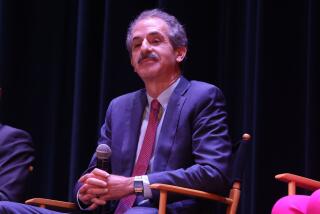U.S. attorney’s office accused of anthrax case leaks
- Share via
WASHINGTON — Attorneys for the former Army physician who was branded a “person of interest” in the deadly 2001 anthrax mailings named three federal officials Friday who they said leaked investigative details that harmed their client.
The physician, Steven J. Hatfill, has not been charged with a crime and maintains his innocence. Hatfill is suing the FBI, the Justice Department and a handful of present and former law enforcement officials. He alleges that the leaks were illegal, damaged his reputation and violated his right to privacy.
“We have identified three of the leakers who were previously anonymous,” one of Hatfill’s attorneys, Mark A. Grannis, said near the outset of a sparsely attended hearing in federal court. “Some of the most damaging information leaked in this case [came] straight out of the U.S. attorney’s office.”
The anthrax mailings killed five people and sickened about 20 others from Florida to Connecticut. Coming on the heels of the suicide attacks on the World Trade Center in New York City and on the Pentagon, the mailings led to the shutdown of a Senate office building and heightened the nation’s fear of prolonged terrorism.
Hatfill’s attorneys alleged that the three officials who leaked investigative details to the media were: Roscoe C. Howard Jr., who from 2001 to 2004 served as U.S. attorney for the District of Columbia; Daniel S. Seikaly, who served as Howard’s criminal division chief; and Edwin Cogswell, who formerly served as a spokesman for the FBI.
One of Hatfill’s attorneys said during the hearing that he would soon seek “sanctions” relating to Howard’s additional role in leading the government’s defense in 2003 and 2004 against the lawsuit. Hatfill’s attorneys named the three purported leakers after questioning six reporters under oath. Howard, Seikaly and Cogswell had released reporters from their earlier pledges of confidentiality, according to a lawyer familiar with the matter. Neither the reporters nor their organizations were named in Friday’s hearing, held to discuss the status of Hatfill’s nearly 5-year-old lawsuit.
Howard and Seikaly, who now practice privately at the same Washington law firm, did not return messages seeking their comment. Cogswell, who is employed by the FBI but in another capacity, could not be reached. His successor said the bureau would not comment because it concerned a matter of ongoing litigation.
An attorney with the Justice Department, Elizabeth J. Shapiro, did not confirm nor deny the alleged leaking during the court hearing. However, Shapiro asked the judge to direct the parties to try to settle out of court.
U.S. District Judge Reggie B. Walton ordered the attorneys for the government and for Hatfill to seek mediation over the next two months. The prospects of a mediated settlement notwithstanding, Walton said he expected that a trial on the lawsuit could begin in December. Hatfill’s attorneys, Grannis and Thomas G. Connolly, did not speculate in court on the likelihood for a settlement.
Afterward, Grannis said: “The court has set a schedule for bringing this case to trial this year, and we’re very pleased at the prospect that Dr. Hatfill will finally have his day in court.”
Hatfill’s lawsuit seeks unspecified monetary damages. It alleges that the defendants’ actions impeded his ability to secure full-time work and that he suffered “severe emotional distress.”
Hatfill, 54, formerly held government positions at the Army’s medical research institute for infectious diseases and at the National Institutes of Health. He did not appear in court Friday.
A settlement of the case could carry political implications: On Aug. 6, 2002, then-Atty. Gen. John Ashcroft first identified Hatfill as a “person of interest” in the anthrax mailings. By settling with Hatfill, the government would all but dispel the possibility that he might ever be charged for the deadly mailings. And -- in an election year when fear of terrorism looms as an important issue -- Hatfill’s exoneration would remind voters that no suspect has been caught.
The anthrax investigation has been one of the largest in the FBI’s history. Based on summaries described publicly by members of Congress, the “Amerithrax” investigation as of late 2006 had led to 9,100 interviews, 67 searches and 6,000 grand jury subpoenas.
Hatfill’s lawsuit argues that officials’ determination to appear in command of the unsolved case drove their efforts against him -- resulting in “a sustained course of willful and intentional misconduct by law enforcement officials who placed the public image of their agencies above their duty to respect the privacy and liberty of an innocent U.S. citizen.”
More to Read
Sign up for Essential California
The most important California stories and recommendations in your inbox every morning.
You may occasionally receive promotional content from the Los Angeles Times.














